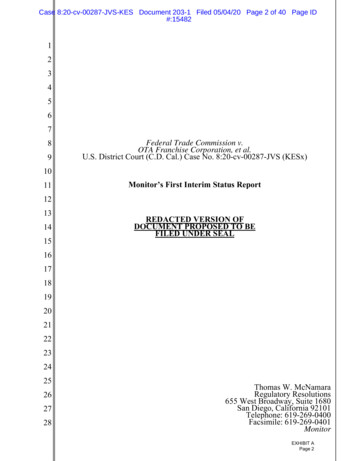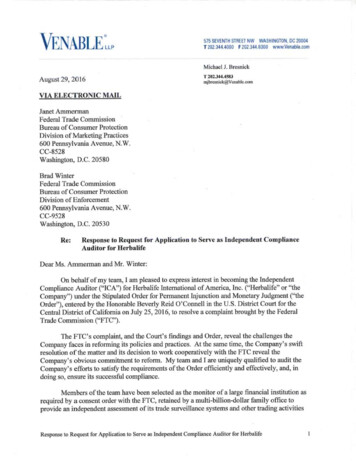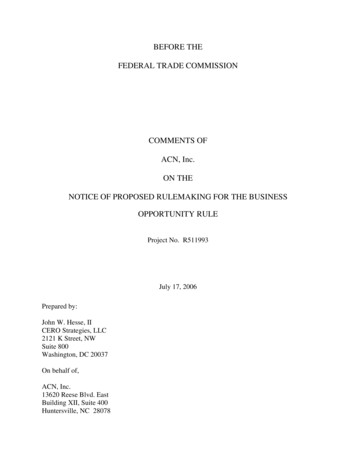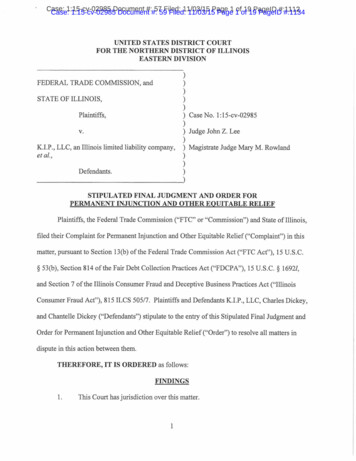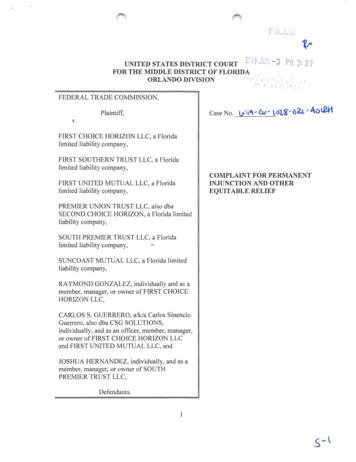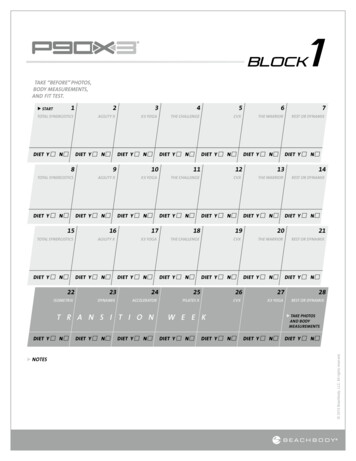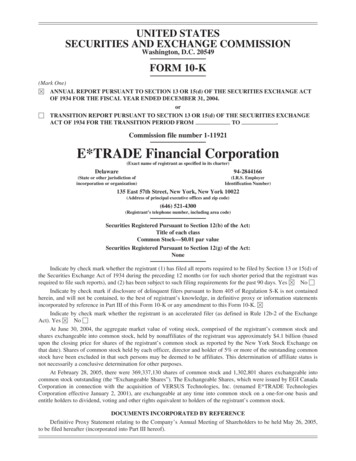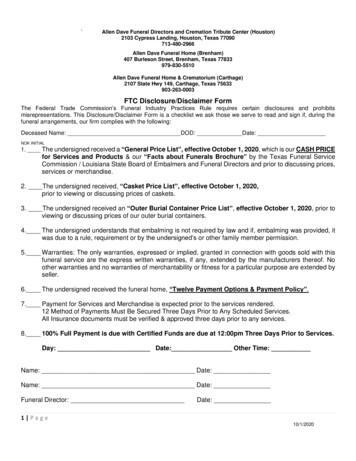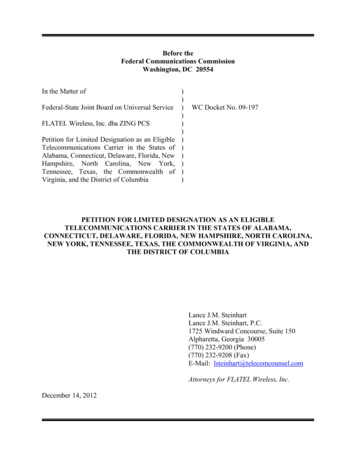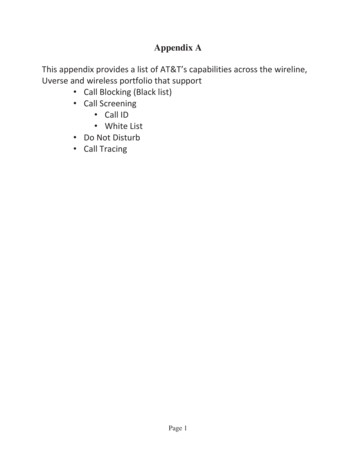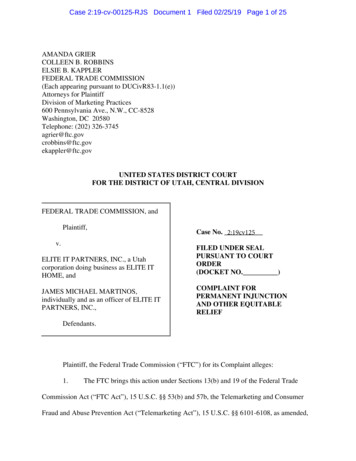
Transcription
Case 2:19-cv-00125-RJS Document 1 Filed 02/25/19 Page 1 of 25AMANDA GRIERCOLLEEN B. ROBBINSELSIE B. KAPPLERFEDERAL TRADE COMMISSION(Each appearing pursuant to DUCivR83-1.1(e))Attorneys for PlaintiffDivision of Marketing Practices600 Pennsylvania Ave., N.W., CC-8528Washington, DC 20580Telephone: (202) .govUNITED STATES DISTRICT COURTFOR THE DISTRICT OF UTAH, CENTRAL DIVISIONFEDERAL TRADE COMMISSION, andPlaintiff,v.ELITE IT PARTNERS, INC., a Utahcorporation doing business as ELITE ITHOME, andJAMES MICHAEL MARTINOS,individually and as an officer of ELITE ITPARTNERS, INC.,Case No.2:19cv125FILED UNDER SEALPURSUANT TO COURTORDER(DOCKET NO. )COMPLAINT FORPERMANENT INJUNCTIONAND OTHER EQUITABLERELIEFDefendants.Plaintiff, the Federal Trade Commission (“FTC”) for its Complaint alleges:1.The FTC brings this action under Sections 13(b) and 19 of the Federal TradeCommission Act (“FTC Act”), 15 U.S.C. §§ 53(b) and 57b, the Telemarketing and ConsumerFraud and Abuse Prevention Act (“Telemarketing Act”), 15 U.S.C. §§ 6101-6108, as amended,
Case 2:19-cv-00125-RJS Document 1 Filed 02/25/19 Page 2 of 25and Section 5 of the Restore Online Shoppers’ Confidence Act (“ROSCA”), 15 U.S.C. §§ 84018405, to obtain temporary, preliminary, and permanent injunctive relief, rescission orreformation of contracts, restitution, the refund of monies paid, disgorgement of ill-gottenmonies, and other equitable relief for Defendants’ acts or practices in violation of Section 5(a) ofthe FTC Act, 15 U.S.C. § 45(a), the FTC’s Telemarketing Sales Rule (“TSR”), 16 C.F.R. Part310, as amended, and Section 4 of ROSCA, 15 U.S.C. § 8403.JURISDICTION AND VENUE2.This Court has subject matter jurisdiction pursuant to 28 U.S.C. §§ 1331, 1337(a),and 1345, and 15 U.S.C. §§ 45(a), 53(b), 57b, 6102(c), 6105(b), and 8404(a).3.Venue is proper in this district under 28 U.S.C. § 1391(b)(1-3), (c)(1-2), and (d),and 15 U.S.C. § 53(b).PLAINTIFFS4.The FTC is an independent agency of the United States Government created bystatute. 15 U.S.C. §§ 41-58. The FTC enforces Section 5(a) of the FTC Act, 15 U.S.C. § 45(a),which prohibits unfair or deceptive acts or practices in or affecting commerce.5.The FTC also enforces the Telemarketing Act, 15 U.S.C. §§ 6101-6108, asamended. Pursuant to the Telemarketing Act, the FTC promulgated and enforces the TSR, 16C.F.R. Part 310, which prohibits deceptive and abusive telemarketing acts or practices.6.The FTC also enforces ROSCA, 15 U.S.C. §§ 8401-8405. ROSCA prohibits thesale of goods or services on the Internet through negative option marketing without meetingcertain requirements to protect consumers. A negative option is an offer in which the sellertreats a consumer’s silence—their failure to reject an offer or cancel an agreement—as consent tobe charged for goods or services.Page 2 of 25
Case 2:19-cv-00125-RJS Document 1 Filed 02/25/19 Page 3 of 257.The FTC is authorized to initiate federal district court proceedings, by its ownattorneys, to enjoin violations of the FTC Act, TSR, and ROSCA, and to secure such equitablerelief as may be appropriate in each case, including rescission or reformation of contracts,restitution, the refund of monies paid, and the disgorgement of ill-gotten monies. 15 U.S.C. §§53(b), 56(a)(2)(A)-(B), 57b, 6102(c), 6105(b), and 8404.DEFENDANTS8.Defendant Elite IT Partners, Inc. (“Elite”) is a Utah corporation with its principalplace of business at 1548 North Technology Way, Building D, Suite 1100, Orem, Utah 84097.Elite transacts or has transacted business in this district and throughout the United States. At alltimes material to this Complaint, acting alone or in concert with others, Elite has advertised,marketed, distributed, or sold computer security or technical support services to consumersthroughout the United States.9.Defendant James Michael Martinos (“Martinos”) is the President of Elite. At alltimes material to this Complaint, acting alone or in concert with others, he has formulated,directed, controlled, had the authority to control, or participated in the acts and practices of Eliteset forth in this Complaint. Defendant Martinos resides in Midway, Utah, and, in connectionwith the matters alleged herein, transacts or has transacted business in this district andthroughout the United States.COMMERCE10.At all times material to this Complaint, Defendants have maintained a substantialcourse of trade in or affecting commerce, as “commerce” is defined in Section 4 of the FTC Act,15 U.S.C. § 44.Page 3 of 25
Case 2:19-cv-00125-RJS Document 1 Filed 02/25/19 Page 4 of 25DEFENDANTS’ BUSINESS ACTIVITIES11.Since at least 2014, Defendants have been operating a technical support schemethat relies on both internet and telephone communication with consumers, including throughoutbound calls prompted by internet searches that lead consumers to Defendants’ website. Thevast majority of consumers Elite contacts are elderly and/or unfamiliar with the workings ofcomputers or the internet. Defendants use intimidation and scare tactics to take advantage ofthese consumers’ limited knowledge about such technology.12.In numerous cases, consumers who interact with Elite are seeking assistance withpassword recovery for email and other accounts. Rather than provide the services requested byconsumers, Defendants’ salespeople insist on gaining access to consumers’ computers to performa sham “diagnostic.” Defendants’ representatives then falsely state to consumers that theircomputers are infected with viruses and infections that threaten the security of consumers’personal information and prevent consumers from accessing their email and other accounts. Innumerous cases, Defendants misrepresent that consumers have inadequate or no antivirusprotection. After making these misrepresentations, Defendants dupe many consumers intopaying large sums for an immediate cleaning of their computers and ongoing computer technicalsupport services.13.Defendants fail to disclose, or to disclose adequately, material terms, includingthat consumers who sign up for ongoing technical services for a monthly rate are signed up for afull 12-month term that automatically renews for another year if the consumer fails to timelycancel; that to cancel services, the consumer must do so in writing at least 30 days before the endof the 12-month term; and that consumers who cancel services within the first 12 months will besubject to a 150 cancellation fee. Many consumers never even obtain the services thatPage 4 of 25
Case 2:19-cv-00125-RJS Document 1 Filed 02/25/19 Page 5 of 25prompted them to contact the company initially, and discover that Defendants have deletedimportant programs or damaged their computers.Defendants’ Sales Practices14.In some instances, Defendants place unsolicited calls to consumers to sell theirservices.15.In other instances, Defendants attract consumers using search engine optimizationtools such as “Google Adwords.” Google Adwords is one of various paid services that driveconsumers to particular websites based on key search terms. Among other things, Defendants’key search terms relate to consumers’ inability to access email and other accounts because theyhave misplaced or forgotten their passwords. Figure 1, below, illustrates the search process andresult, with the search terms and result highlighted.Figure 1l focgof my em8ll passwordAllcan't Get Into Your EmaI11 Access Your Email Account Now-gel tl.i com.emJ. llelp .,. " .(1 e:i;,eru." I - '01.i .un.,.CF, O,.,gncn,s H: 1-.ddm - Ta ID US. 6bled lCtl Hor.ot A:io\11 U1 Gel Htlp No1tF You, Email Pauword? I Get Email Suppon I ellteithome com VHM ddei'.11011:etom'EmaJ IT: ;-.-r,!'A i M - Ull' Ul- 1:,hmt.c,Get a frff Quota c. E.ma,i! AcCHS G I Help tiq lncl'tlle P C s -·Page 5 of 25
Case 2:19-cv-00125-RJS Document 1 Filed 02/25/19 Page 6 of 2516.When consumers click on the sponsored result link for Elite, they are directed to awebpage for the company (www.eliteithome.com/Email Problems) that offers a “free, NoObligation PC Diagnostic” for “Email Problems,” illustrated in Figure 2, below.Figure 2EMAIL1 11 1.b e111 tPROBLEMS?mto!owU.«tll' r«b pahSPEAK TOLIVE AGENTx Last NameEmailPhone I h,tl l{' r.i.ie h.,11 Fm:ul Loom P.1,,\\fltclSt:1111 ' " l·m:,il. . rlnHPtn . p-0\'4ot)O\lf i!OOlJICJnb.:1o'- \0lie anN}pd1 )01etpol!-kn1 "llh Ml!IEmailFin:1.11 Pn,,w(lJ,J Pu1bl lhC. an'I Gi.1 mto()n!,\\\-ord R\! tCuia111Mv17.Once consumers land on Defendants’ webpage, Defendants invite them to“SPEAK TO A LIVE AGENT” by providing their name, email address, and phone number.Consumers who submit this information by pressing the “HELP ME!” button, are then directedto another webpage for Elite, pictured in Figure 3, below. Defendants then contact theconsumers by telephone.Page 6 of 25
Case 2:19-cv-00125-RJS Document 1 Filed 02/25/19 Page 7 of 25Figure 31-877-704-3223Thank You!Please Stay On This PageW under ' l,md liter l' rs .ini suC' wrth your technology.AU. . b.i,;cd technician isr,, v1rwing your inform.ii ,ondlld w1ll lai w, 1IJ1 ling you' hortlyf 01 fd' l r t'IVICE' \ d !I Oll l18.Elite ITe5upportJoin """--- Start, "'0Paragraphs 19 through 40 describe Defendants’ sales practices regardless of theinitial contact method.19.Defendants’ salespeople state or imply, either directly, indirectly, or by failing tocorrect consumers’ obvious misimpressions, that they are, or are authorized to provide servicesfor, consumers’ internet or email providers, or other large well-known companies. In numerousinstances, Defendants’ representatives falsely state that two internet service and email providers,AOL and Yahoo, are defunct and no longer provide customer service.20.Regardless of the consumer’s stated problem, Defendants’ sales representativesare trained to tell the consumer that any problem is likely related to viruses and infections, and toinsist that Elite must gain remote access to the consumer’s computer to diagnose the problem.Page 7 of 25
Case 2:19-cv-00125-RJS Document 1 Filed 02/25/19 Page 8 of 2521.To initiate a remote session and gain access to consumers’ computers,Defendants’ sales representatives direct consumers to a remote connection webpage run byLogMeIn. Once Defendants’ sales representatives have access, consumers are able to see thesales representatives’ activity on their computer screen. At this point, Defendants’ salesrepresentatives can completely control the consumers’ computers and, for example, can move thecursor, “draw” on the screen, enter commands, run applications, and access stored information.Working from a script, Elite’s salespeople then walk the consumer through a purporteddiagnostic process that inevitably leads to the conclusion that the consumer’s computer isinfected with viruses and infections and must be cleaned to ensure the security of the consumer’sprivate information, including passwords, and allow for access to email and other accounts.Defendants’ “Diagnostic”22.After gaining access to consumers’ computers, Defendants’ representatives’ firststep is to download and run a free version of a diagnostic tool available on the internet called“SUPERAntispyware.” SUPERAntispyware purports to identify multiple “Detected Threats” asdepicted in Figure 4, below. In numerous instances, these so-called “Detected Threats” are only“cookies.” Cookies are small text files placed on a user’s computer/browser when visitingcertain websites. Web browsers use cookies to provide routine features for consumers, such asstoring consumers’ preferences. The Windows operating system is constantly creatingtemporary files as part of its normal behavior and these files do not constitute a problem, but aremerely artifacts of normal system behavior that are always present in a computer runningMicrosoft Windows operating system. In addition, web-browsing cookies are almost alwaysbenign. Cookies cannot and do not: access or read a computer’s hard drive, access a user’sPage 8 of 25
Case 2:19-cv-00125-RJS Document 1 Filed 02/25/19 Page 9 of 25personal information, or send emails or control functions on a user’s computer. They are not“threats” in any sense.Figure 4tf)Tout lttms Scanned: 64245 El31)Ud T ,,.! 00 00 21 rues Scanned; 7735C ,\tl·JOOWS\SYSTE 32'0R JERS( rue Threats: 53 )"' 'SA J.lcmOf'( Items Scanned: 150LJ C ,'t1 DOWS\ YSTE 'l2 E.t 2DllS Reglst,y Objects Setton d· 56360E3 ,,&4)HKIJ' .,t,:it ,JJicrose,,.-r tiindows\CUffenr.rtrslon\Acp PT,1,ME EXE00{::j 0.tKttd Thrtats0[ Total: 153]Thru loooJ dur n;i 11\1, Cl!\ art l1ltt I l tl rN( 53 Items Found )23.Defendants’ salespeople, however, are instructed to tell consumers that the itemsdetected, even if merely cookies, are dangerous and allow information to be stolen from theuser’s computer. They insist that the items must be removed, even when the consumer is onlyseeking assistance in recovering a password or accessing an account.Page 9 of 25
Case 2:19-cv-00125-RJS Document 1 Filed 02/25/19 Page 10 of 2524.Another step in the “diagnostic” is for Defendants’ salespeople to open Windows“Task Manager,” and show consumers the information displayed about CPU (Central ProcessingUnit) usage and processes.25.The salespeople tell consumers that the graph of CPU usage, as shown in Figure5, below, indicates the existence of a virus when the CPU usage is high. While speaking to thesales representative, the consumer sees the CPU usage going up and down in the graph.Defendants’ salespeople tell the consumer that a high CPU usage is a “red flag” that indicatesthat the computer is working too hard.Figure 5 w.-T1 1.i . 0pl,o,,,- -- - - - - - - - - -v,. ! Ip'""""""''--ii- Pe,- - lo"; /.Cl Nd,,A,- 1101187,. ., JU!6(91/Usogell'I.14!4)661 oc.-. . --:,,.t,h cC.-tf:J)K.,lllll'"""'Y04!)PogtdPlo tslt!: ·5-8150)9)5SI0:0l:J?:012/ IS.P"1f, 11Mffflo,y29'\Page 10 of 25-- - OX
Case 2:19-cv-00125-RJS Document 1 Filed 02/25/19 Page 11 of 2526.The representatives’ statements are false. If a computer is managing a heavyworkload, the CPU will constantly run higher with no adverse effects on the computer. The CPUis designed to run at maximum power for long periods of time.27.Defendants’ sales representatives also open the “processes” tab on Windows TaskManager, as depicted in Figure 6, below.Figure 6 ----u--" tHome Homo,-t.cxc-Home --.,,.,. """H ""' -C" . H- .,.,, .cx:cWIS. S o --SO'ttne:c:n'I(,.Srype.ece -J2-·- - -· ,.,.,. onooon.eu,-- -t omeHomo, Per,.,,CPU000000050000000000000009000000000000- tworknv U.s. c.U,52Kl9,'96K2,02:SK .lOIIK35,060KJ,. lOK2.-1(,'94K1 ,9 K8,MOK1,9681(51,404K19,920K90,U21(I ll,996K18,. K2.692K2.516K Od:Ona,OOMSuT . "'"-··.-.- .'T s.,.1c,,,c Noa.off . 7:SC: -- SCTcc,,,Co . su: BtAn l-tM1 PrO .,.-. .Ll roc .,.; SI28.CPU Uwge l8'1i.Defendants’ representatives warn consumers that a large number of processesindicates the presence of malicious software and viruses. In fact, no one can detect the presenceof malicious software and viruses merely by looking at the number of processes running. Therepresentatives’ statements are false.Page 11 of 25
Case 2:19-cv-00125-RJS Document 1 Filed 02/25/19 Page 12 of 2529.Defendants’ representatives also point to the absence of “user” names in theprocesses menu for some processes, telling consumers that this is a “red flag” or indication thatthe computer is infected. In fact, the absence of a “user name” value is typical, and does notindicate a problem on the system or the presence of a virus.30.Defendants’ salespeople also run the MSCONFIG.EXE application, whichdisplays information on the start-up menu, as depicted in Figure 7, below.Figure 7.-.-.----31.9-.yi ,: Tc tno ."'C:'flro;,om nl. Inc.Mool:Oft Corp. A.par- Inc"'C:'frog,4111 ."'C:'flro;rcm Fil.HJCLM \'ARf\ ."'C:'frogr.w .HIQ.M\ .Defendants’ representatives tell consumers that if an antivirus program is installedand running properly, it should appear on the start-up menu, and that because no antivirusprogram appears in the start-up menu, the consumer’s computer is exposed to viruses as there isno properly running antivirus program on the computer. This is false. The programs displayedon the start-up screen are those that are started when the user logs in. Antivirus software isPage 12 of 25
Case 2:19-cv-00125-RJS Document 1 Filed 02/25/19 Page 13 of 25started shortly after the Windows operating system begins running and would not be displayedon this screen.32.Defendants’ salespeople use this portion of the diagnostic to pitch Elite’spreferred antivirus program, “Trend Micro Pro,” which they claim is distinct from other antivirusprograms in that it runs continuously, while others allegedly scan only once a day. In fact, mostantivirus software programs run continuously, including programs pre-loaded on Windows-basedsystems such as Microsoft Defender, and its earlier iteration, Microsoft Security Essentials.33.By exploiting consumers’ concerns about internet threats like viruses and otherinfections, and misrepresenting to consumers that they have no antivirus—or inadequateantivirus—protection, Defendants scare consumers into believing that their computers are inimminent danger. Based on Defendants’ misrepresentations and unsubstantiated claims,Consumers spend 99.99 or more for a one-time “cleaning” of non-existent viruses andinfections from their computers.34.Using the same misrepresentations and scare tactics, Defendants then upsellconsumers additional technical support service plans that typically cost 19.99 (Gold Care), 29.99 (Platinum Care), and 39.99 (Unlimited Care) per month, respectively. These plans aredistinct from the one-time services provided by Elite because they also include what Defendantsdescribe as “preventative care” services at increasing levels of frequency (Gold – every 90 days;Platinum – every 45 days; and Unlimited – unlimited technical support during business hours),antivirus software (Trend Micro Pro), data backup, help desk services, and data recovery. AfterDefendants have enrolled consumers in technical support service plans, they further upsell theirhigher grade plans.Page 13 of 25
Case 2:19-cv-00125-RJS Document 1 Filed 02/25/19 Page 14 of 2535.Defendants fail to disclose orally prior to obtaining consumers’ consent topayment, the terms of enrollment in its technical support service plans, including that theyrequire a one-year commitment, and that the plans automatically renew—and the consumer ischarged—for a second year if he or she fails to cancel in writing at least 30 days prior to the endof the year.36.Defendants also fail to disclose orally prior to obtaining consumers’ consent topayment, that consumers who cancel within the first year will be charged a 150 earlycancellation fee. They also fail to disclose orally to consumers who upgrade their technicalsupport service plans that the one-year commitment restarts with the upgrade.37.As illustrated in the screen shot in Figure 8, below, consumers are required tosubmit their payment information without Elite clearly and conspicuously disclosing on theconsumer’s computer screen all material terms of the transactions referred to in Paragraphs 35and 36. Instead, this information is buried in terms and conditions that do not appear on the signup page.Page 14 of 25
Case 2:19-cv-00125-RJS Document 1 Filed 02/25/19 Page 15 of 25Figure 8@ Elite IT H m You h:ne elected our Gold Pinn!P1)'111'1ll T'yp Nllu( on CardCard N'umbcrMootb\ "arv[C"VV.Addn:,.,e n 1ces Co\'t'ffliSub\Cnptioo Amoum S19 99OtlllllllC)'CI(OtltmiDa1c-Addres;(Conl); 1/DHurfl(NII lnt ,.'JC11yCounuy. 1t· n.,., u,nu.u n yr. HI:.au.,.aiI , aa.u. /aon.Jt. 011.i a liKUC.Statc'Prav:PoSlal CodePla:,c read dlt' Tenn and Coo ht10n t llllt 11c IMtt 10 . , , IIM , .,.,, ud · ll lkl!ta.:169.910 Lifelock·38.Lifolocl c,n,fie I PrutnerDefendants not only fail to disclose orally and visually on the consumer’scomputer screen
sale of goods or services on the Internet through negative option marketing without meeting certain requirements to protect consumers. A negative option is an offer in which the seller treats a consumer’s silence—their failure to reject an offer or cancel an agreement—as consent to be charged for goods or services. Page 2 of 25
